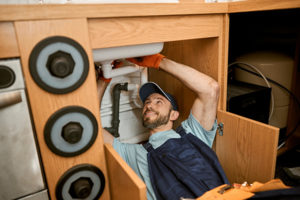 Introduction
Introduction
In the bustling world of commercial operations, plumbing issues can quickly escalate from minor inconveniences to major disruptions, affecting everything from daily productivity to customer satisfaction. Understanding the nuances of common commercial plumbing repairs is crucial for business owners and facility managers alike, ensuring that small problems are addressed promptly before they evolve into costly emergencies. This guide dives into the most frequently asked questions about commercial plumbing repairs, shedding light on the causes, solutions, and preventive measures to keep your plumbing system running smoothly.
Understanding Commercial Plumbing Systems
Commercial plumbing systems differ significantly from their residential counterparts, not only in size but also in complexity. Designed to handle a higher volume of usage and a wide variety of waste products, commercial systems require specialized knowledge and equipment for effective maintenance and repair. These systems encompass everything from multiple floors of bathrooms and kitchen facilities to extensive sewer lines that service entire buildings or complexes. Given their scale and the critical role they play in the operations of a business, understanding the basics of how these systems function can help identify issues early and minimize the impact on your business.
The complexity of commercial plumbing also means that issues can arise in numerous areas, from the visible fixtures within the building to the hidden networks of pipes and drains that run behind the scenes. Regular inspections and maintenance are key to preventing problems, but even with the best care, repairs will occasionally be necessary. Recognizing the early signs of plumbing issues and knowing when to call in professionals is essential for quick resolution and to avoid disruptions to your operations.
Frequently Encountered Commercial Plumbing Issues
Commercial plumbing systems face a range of issues, some of which occur more frequently than others. Common problems include:
- Clogged Drains: Whether from accumulated debris, grease build-up in kitchen areas, or improper disposal of materials, clogged drains are a frequent nuisance in commercial settings. They can lead to slow water drainage, backups, and even flooding if not addressed.
- Leaky Faucets and Fixtures: Constant use can wear down the components of faucets and other fixtures, leading to leaks. Even small drips can significantly increase water bills and contribute to water wastage.
- Toilet Malfunctions: Commercial toilets undergo heavy use, making them susceptible to various problems, including clogging, continuous running, and flushing issues.
- Sewer System Backups: More severe than simple drain clogs, sewer backups can pose significant health risks and operational disruptions, often requiring immediate professional attention.
Addressing these issues promptly can not only save on repair costs but also prevent the inconvenience and potential loss of business that plumbing failures can cause. The following sections will explore these common problems in more detail, providing insights into their solutions and prevention.
Sewer System Backups: Identification and Response
Sewer system backups pose serious risks to commercial properties, potentially causing extensive property damage, health hazards, and regulatory violations. Identifying the signs of a sewer backup early is crucial for minimizing the damage and preventing further contamination. Common indicators include foul odors, slow drains, gurgling noises from drains or toilets, and sewage backups in floor drains or low-lying fixtures.
Upon detecting signs of a sewer backup, it’s essential to act swiftly and contact a professional plumbing service specializing in commercial sewer repairs. Professional plumbers have the expertise and equipment to assess the extent of the backup, identify the underlying cause, and implement effective solutions to restore proper drainage and sanitation. Depending on the severity of the backup, repairs may involve clearing blockages, repairing damaged sewer lines, or even replacing sections of the sewer system.
Implementing preventive measures can also help reduce the risk of sewer backups. Regular maintenance, including sewer line inspections and cleaning, can identify potential issues before they escalate into backups. Additionally, educating employees about proper waste disposal practices, such as avoiding flushing non-biodegradable items down toilets, can help prevent blockages and minimize the likelihood of sewer backups occurring.
Water Heater Issues: Ensuring Consistent Hot Water Supply
Commercial water heaters play a vital role in providing a reliable hot water supply for various applications, including handwashing, cleaning, and sanitation. However, like any mechanical system, water heaters are susceptible to malfunctions and breakdowns that can disrupt business operations. Common water heater issues include inadequate hot water supply, fluctuating water temperature, leaks, and unusual noises.
Addressing water heater problems promptly is essential to prevent disruptions and ensure the continued functionality of essential services. Professional plumbers can diagnose water heater issues accurately and recommend appropriate repair or replacement options based on the age, condition, and type of water heater. In some cases, simple adjustments or component replacements may resolve the issue, while more severe problems may require the installation of a new water heater.
Regular maintenance is key to extending the lifespan of water heaters and preventing premature failures. Flushing the tank regularly to remove sediment buildup, inspecting and replacing sacrificial anode rods as needed, and checking for leaks and corrosion are essential maintenance tasks that can help keep water heaters operating efficiently and reliably. By investing in proactive maintenance and timely repairs, businesses can ensure a consistent hot water supply for their operations while minimizing energy waste and unnecessary expenses.